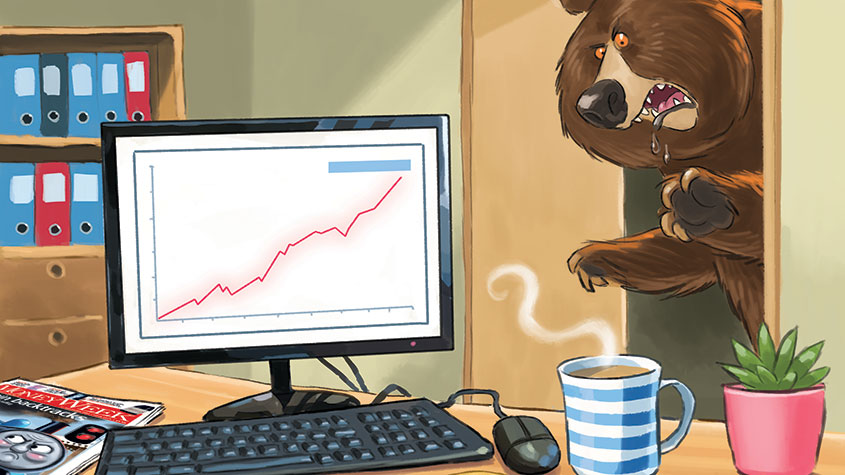Why people are so bad at investing
Value investor Jeremy Grantham has come up with a model that explains market booms and busts over nearly 100 years: people are just really bad at investing.

Get the latest financial news, insights and expert analysis from our award-winning MoneyWeek team, to help you understand what really matters when it comes to your finances.
You are now subscribed
Your newsletter sign-up was successful
Want to add more newsletters?

Twice daily
MoneyWeek
Get the latest financial news, insights and expert analysis from our award-winning MoneyWeek team, to help you understand what really matters when it comes to your finances.

Four times a week
Look After My Bills
Sign up to our free money-saving newsletter, filled with the latest news and expert advice to help you find the best tips and deals for managing your bills. Start saving today!
Low interest rates, disruptive new business models, the ongoing impact of globalisation you can come up with plenty of theories as to why share prices are so expensive just now. But well-known value investor Jeremy Grantham has produced an elegantly simple model that explains market booms and busts stretching back for nearly 100 years. His explanation? People are just really bad at investing.
I look at his behavioural model in more detail on this week's strategy page. But it boils down to a very simple observation investors will pay more for stocks when it feels good to do so. When economic conditions are forgiving and companies are making hay, investors are willing to pay a lot more for future earnings from companies. They feel optimistic and comfortable, and this optimism gets priced in to the market.As a result, price/earnings ratios (p/es, which show how much investors are willing to pay for a given £1 of earnings today) are driven higher, and the market gets expensive. But when economic conditions are bad, and companies are struggling to make decent profits, investors get gloomy and scared. They no longer feel comfortable shelling out a lot of money for future earnings. So p/e ratios fall and the market gets cheap.
This is irrational. Economies are cyclical. Good times come and go. But during both good times and bad times, investors act as though high prices will go on forever. They don't "buy low and sell high", as the old, glib stockmarket advice puts it. Instead they buy when prices are high because they think they can only go higher; and they sell when prices are low because they can't see an end to the pain.
MoneyWeek
Subscribe to MoneyWeek today and get your first six magazine issues absolutely FREE

Sign up to Money Morning
Don't miss the latest investment and personal finances news, market analysis, plus money-saving tips with our free twice-daily newsletter
Don't miss the latest investment and personal finances news, market analysis, plus money-saving tips with our free twice-daily newsletter
If you fancy yourself a rational investor, you should be able to exploit this. But you will experience some unpleasant emotions. As Howard Marks of Oaktree Capital, another great value investor, wrote in 2014: "Most great investments begin in discomfort bargains are usually found among things that are controversial, that people are pessimistic about, and that have been performing badly of late." One example of an uncomfortable investment right now could be the retail sector in the UK. With Amazon on one side and budget retailers on the other, life is hard for your average shopkeeper. But Phil Oakley sees some bright spots on the high street he looks at the best options in our cover story.
Meanwhile, investors who want to resist their heart's instinctive desire to invest and divest at the worst possible moments should add another bit of classic advice to the "buy low, sell high" clich. During both good times and bad times, it pays to remember: "this too shall pass".
Get the latest financial news, insights and expert analysis from our award-winning MoneyWeek team, to help you understand what really matters when it comes to your finances.

-
 Japanese stocks rise on Takaichi’s snap election landslide
Japanese stocks rise on Takaichi’s snap election landslideJapan’s new prime minister Sanae Takaichi has won a landslide victory in a snap election, prompting optimism that her pro-growth agenda will benefit Japanese stocks
-
 Alphabet 'is planning a 100-year bond': would you back Google for 100 years?
Alphabet 'is planning a 100-year bond': would you back Google for 100 years?Google owner Alphabet is reported to be joining the rare century bond club
-
 What to do as the age of cheap money and overpriced equities ends
What to do as the age of cheap money and overpriced equities endsEditor's letter The age of cheap money, overpriced equities and negative interest rates is over. The great bond bull market is over. All this means you will be losing money, says Merryn Somerset Webb. What can you do to protect yourself?
-
 Investors are bullish – but be very careful
Investors are bullish – but be very carefulEditor's letter Many investors are buying the dip, convinced the latest upswing is the start of a new bull market. The odds are that it’s not, says Andrew Van Sickle. The bear has unfinished business.
-
The MoneyWeek approach to investing
Editor's letter At MoneyWeek, our aim is simple: to give you intelligent and enjoyable commentary on the most important financial stories, and tell you how to profit from them. So how do we do that?
-
 Celebrity bitcoin ads echo the subprime mortgage crisis
Celebrity bitcoin ads echo the subprime mortgage crisisEditor's letter A wave of ads featuring celebrities punting crypto to the masses are reminiscent of how low income Americans were encouraged to take on loans they couldn’t afford, says Merryn Somerset Webb.
-
 Will the UK's property slowdown turn into a house-price crash?
Will the UK's property slowdown turn into a house-price crash?Editor's letter As the cost-of-living crisis intensifies and interest rate rise, it is hard to see reasons for UK house prices to keep rising, says Merryn Somerset Webb.
-
 The unintended consequences of ESG investing
The unintended consequences of ESG investingEditor's letter Many people are refusing to invest in energy companies, citing "ESG" concerns. But we still need fossil fuels, says Merryn Somerset Webb, and will for years to come. Boycotting the sector is a bad idea.
-
 What sardines can teach investors about today's markets
What sardines can teach investors about today's marketsEditor's letter A California tale of “eating sardines” and “trading sardines” can help us divide investments into speculative and real, says Merryn Somerset Webb. Something that's very useful when looking at today’s markets.
-
 The market finally seems to be getting it
The market finally seems to be getting itEditor's letter Reality checks are coming fast to the markets, says Merryn Somerset Webb – with even 2022’s safe havens beginning to reflect recession worries.